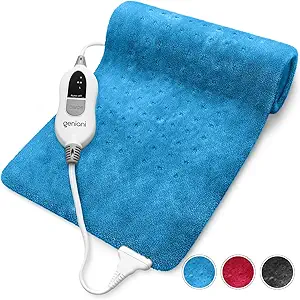The Ultimate Buying Guide for Sleep Support: A Comprehensive Overview of Sleep Aids, Supplements, and More
Overview
Sleep is essential for good health and well-being, but many people struggle to get the quality and quantity of sleep they need. If you're one of them, you're not alone. Fortunately, there are many sleep support products and solutions available that can help you improve your sleep and wake up feeling refreshed and energized. In this buying guide, we'll explore some of the most popular and effective sleep support products and solutions, including sleep aids, supplements, and more.
Types
1. Sleep Aids: Sleep aids are products that can help you fall asleep faster and stay asleep longer. Some popular sleep aids include:
- Over-the-counter sleep aids: These are medications that can be purchased without a prescription and include antihistamines, such as diphenhydramine and doxylamine succinate.
- Prescription sleep aids: These are medications that require a prescription from a doctor and include benzodiazepines, such as temazepam and lorazepam, and non-benzodiazepines, such as zolpidem and eszopiclone.
- Natural sleep aids: These are products that contain natural ingredients, such as melatonin, valerian root, and chamomile, that can help promote relaxation and sleep.
2. Sleep Supplements: Sleep supplements are products that contain vitamins, minerals, and other nutrients that can help support healthy sleep. Some popular sleep supplements include:
- Melatonin supplements: Melatonin is a hormone that regulates sleep and wake cycles, and supplements can help increase melatonin levels in the body.
- Magnesium supplements: Magnesium is a mineral that can help promote relaxation and sleep.
- Vitamin D supplements: Vitamin D deficiency has been linked to poor sleep quality, and supplements can help increase vitamin D levels in the body.
3. Sleep Environment Products: Sleep environment products are products that can help create a comfortable and conducive environment for sleep. Some popular sleep environment products include:
- White noise machines: White noise can help mask distracting sounds and promote relaxation and sleep.
- Sleep masks: Sleep masks can help block out light and promote deeper sleep.
- Essential oils for sleep: Essential oils, such as lavender and chamomile, can help promote relaxation and sleep.
4. Sleep Disorder Products: Sleep disorder products are products that can help manage and treat sleep disorders, such as insomnia, sleep apnea, and restless leg syndrome. Some popular sleep disorder products include:
- CPAP machines: CPAP machines are used to treat sleep apnea by delivering a continuous stream of air to keep the airway open during sleep.
- Medications: Medications, such as benzodiazepines and non-benzodiazepines, can be used to treat insomnia.
- Compression socks: Compression socks can help relieve symptoms of restless leg syndrome.
Key Considerations
1. Safety: Before using any sleep support product, it's important to consider its safety. Some sleep aids and supplements can have side effects or interact with other medications, so it's important to consult with a healthcare professional before use.
2. Effectiveness: Not all sleep support products are created equal, and some may be more effective than others. It's important to do your research and read reviews to find products that have been proven to be effective.
3. Price: Sleep support products can vary widely in price, so it's important to consider your budget when selecting products.
Features
1. Ingredients: When selecting sleep supplements or natural sleep aids, it's important to consider the ingredients and ensure they are safe and effective.
2. Dosage: It's important to follow recommended dosages for sleep aids and supplements to avoid side effects and ensure effectiveness.
3. Comfort: When selecting sleep environment products, such as mattresses and pillows, it's important to consider comfort and support.
Prices
Sleep support products can vary widely in price, depending on the type and brand. Over-the-counter sleep aids can range from $5 to $30, while prescription sleep aids can cost $50 to $200 per month. Natural sleep aids and supplements can range from $10 to $50 per bottle, while sleep environment products can range from $10 to $100 or more.
Tips
1. Establish a bedtime routine: Establishing a consistent bedtime routine can help signal to your body that it's time to sleep and promote relaxation.
2. Create a comfortable sleep environment: Creating a comfortable sleep environment, such as a cool, dark, and quiet room, can help promote deeper sleep.
3. Limit screen time: The blue light emitted by screens can interfere with sleep, so it's important to limit screen time before bed.
FAQs
Q: Are sleep aids safe?
A: Sleep aids can have side effects and should be used with caution. It's important to consult with a healthcare professional before use.
Q: Can sleep supplements help me sleep better?
A: Sleep supplements can help support healthy sleep, but their effectiveness can vary. It's important to do your research and choose supplements that have been proven to be effective.
Q: What is the best sleep environment for good sleep?
A: A cool, dark, and quiet room is ideal for good sleep.
Q: How can I manage sleep apnea?
A: CPAP machines are often used to manage sleep apnea, but other treatments may be necessary. It's important to consult with a healthcare professional for proper diagnosis and treatment.
Q: Can essential oils help me sleep better?
A: Essential oils, such as lavender and chamomile, can help promote relaxation and sleep, but their effectiveness can vary. It's important to choose high-quality oils and use them safely.
Conclusion
In conclusion, sleep support products and solutions can help improve your sleep and overall health. By considering safety, effectiveness, and price, and choosing products that meet your needs and preferences, you can find the right sleep support products to help you get a good night's sleep.














